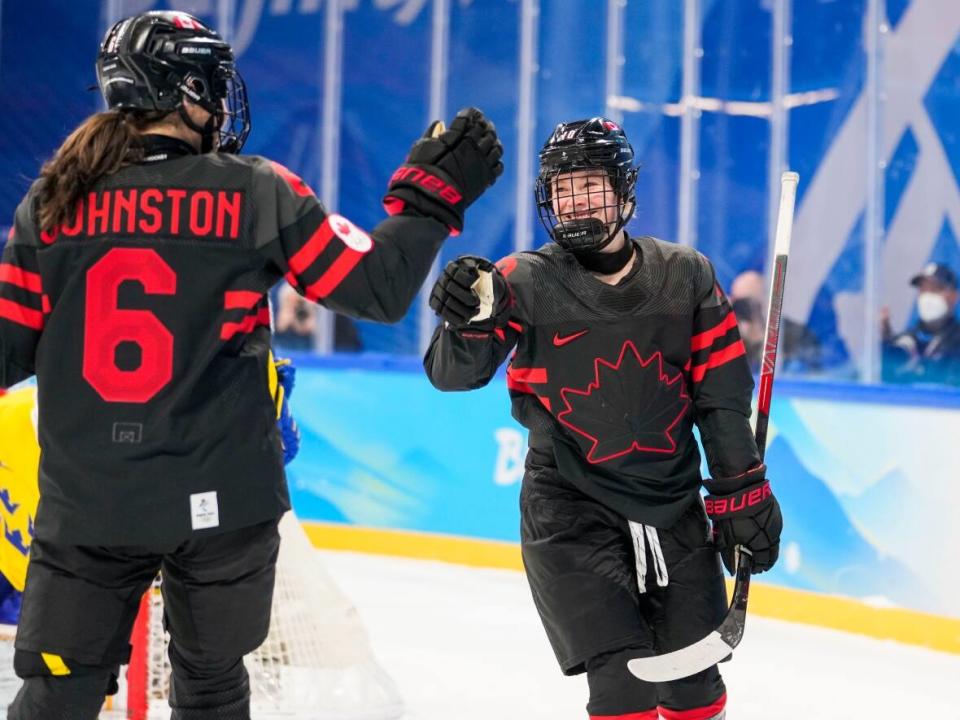'Generational talent' Sarah Fillier exceeding lofty pre-Games expectations in Beijing

Those who know Sarah Fillier expected her to turn some heads at the Olympics. But as the women's hockey tournament progresses, the 21-year-old is finding ways to surprise even them.
Before the competition began, Princeton head coach Cara Morey had warned analysts that Fillier's contributions may not be obvious from the stats sheet.
"If you're expecting her to score a ton of goals, you might be disappointed because she's more of a playmaker," Morey recalls saying. "But if you watch what she does with the puck and away from the puck, you're going to realize she's one of the greatest players that we've seen.
"And then she goes and leads the Olympics in scoring!"
With eight goals and two assists through five games, Fillier is tied for first in goals and sits fifth overall in points. She's been so dominant that a game in which she helped set up the opening goal stands as her least remarkable showing.
WATCH | Princeton women's hockey coach raves about Sarah Fillier:
While Morey's prediction may seem foolish in hindsight, she was only half wrong. Fillier's movement off the puck and ability to read the play have formed the basis of the 5-foot-5 centre's success.
"She's just got that extra sense," said two-time Olympic champion Cheryl Pounder, who serves as analyst on the CBC broadcasts. "She knows where to be, how to get to a soft spot with good timing. She will take two crossovers outside of the dot in order to get the [defence] to turn their feet.
"You very rarely see her drive the net when it's not there, or force a play around the net. If she doesn't think she can beat you one-on-one, she'll pull up, she'll create space, she'll open up a lane for someone else."
Bradi Cochrane, who coached Fillier through high school, first saw the budding star when she was 13 years old.
"At that age, her skill level was definitely superior to her peers," Cochrane told CBC Sports. "But I think the biggest thing was just how she thought the game. You could honestly see her scanning the ice every single shift and survey what's happening and how to attack the defence and offensive players."
As she got older, Cochrane says, Fillier began honing in on the minutiae of the game. If a teammate excelled at a drill, Fillier immediately sought to understand how: Did they get the defender's feet to move? Did they move the stick? Did they slow down?
WATCH | All of Canada's 11 goals in win over Sweden at Beijing Games:
Even as the best player in her age group, she was always looking to add another element to her game, peppering her coaches with questions. That hasn't stopped.
"She doesn't think by any means that she is fully developed," Morey said. "She's super humble. She knows she has a long way to go, so she wants to learn."
In recent years, Fillier's focused on applying her diverse range of skills to incite and exploit vulnerabilities in her opponents. The fruits of those efforts have been obvious on the Olympic ice.
"She's started to really ask herself, 'How do I manipulate the defence's feet in the neutral zone?'" Cochrane explained. "She's really starting to put those small skills that she has [to strategic use], and is attacking the weaknesses that she can now create, but also see."
Fillier and Cochrane still occasionally analyze video together, and Fillier has been keen to evaluate every little detail that contributes to a successful play, from body positioning to edgework. With her combination of speed, intelligence and skill, she's able to quickly carry her learnings into game situations.
While she's never flinched under the pressure of high-stakes competition, Fillier's also not one to seek out the spotlight. Both Morey and Cochrane describe her as incredibly humble, with a family that keeps her grounded. Being the centre of attention has taken some adjustment.
WATCH | Role of women's hockey at Beijing Olympics:
In the fall of her sophomore year, Morey noticed that Fillier was pulling up on drills at practice, letting others finish first. It led to an emotional conversation.
She wanted to be the best, but Fillier worried that constantly winning everything might come across as conceited.
"That's not who you are," Morey told her. "You just need to win every race, you need to win every battle. Being the greatest, you have to carry that burden."
If her performance in Beijing is any indication, she's managed to adapt. And despite her prodigious talent and devotion to improve, Fillier doesn't let the sport consume her.
"I think the most remarkable thing about Sarah is her life balance," Morey said. "You would look at a player like this and think that she's really intense and she just wakes up and eats, sleeps, and breathes hockey, and it's not who she is. She loves hockey, and she's great at hockey. But she's so much more than just Sarah Fillier, the hockey player."
Fillier is recognized as a thoughtful leader, and was voted captain at Princeton in just her second season. She's also quick to credit ― and express gratitude to ― those around her.
When Fillier scored her first NCAA goal, Cochrane texted her congratulations. Rather than a simple 'thank you,' Fillier replied with a lengthy, heartfelt message, emphasizing the coach's impact on her development.
"It was something that brought tears to my eyes," Cochrane said.
Morey and Cochrane see no limits to Fillier's potential, as she continues to grow as both an athlete and a person. Neither is convinced that she fully understands just how incredible she is, though they figure she must be catching on.
"She's a generational talent," Pounder said. "I'm excited to have the opportunity to call her first Olympic Winter Games."

